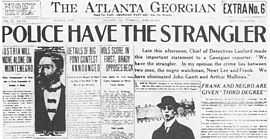Atlanta Georgian
|
1913 Georgian front page | |
| Type | Daily newspaper |
|---|---|
| Format | Broadsheet |
| Owner(s) |
Hearst Corporation James M. Cox |
| Founded | 1906 |
| Political alignment | Democratic |
| Ceased publication | 1939 |
| Headquarters | Atlanta, Georgia, U.S. |
| Circulation | 75,178 (peak) |
The Atlanta Georgian was a daily afternoon newspaper in Atlanta, Georgia. Founded by New Jersey native, Fred Loring Seely, the first issue was April 25, 1906, with editor John Temple Graves. They mainly criticized saloons and the convict lease system. In February 1907, Seely expanded the paper by buying out the Atlanta News.[1] The paper was struggling when William Randolph Hearst purchased it in the spring of 1912 (his ninth newspaper property[2]); he transformed it into a yellow press, making it much more successful, if less respected. Noted journalist James B. Nevin became editor (continuing until his death in 1931) and started the Empty Stocking Fund in 1927.
That year the paper was awarded the Sutlive Trophy, given by the Georgia Press Association. By the 1930s it was the third largest paper in Atlanta with a circulation of 75,000: far behind the Journal (98,000) and the Constitution (91,000).[3] In 1939, James M. Cox purchased it at the same time as the Atlanta Journal (now The Atlanta Journal-Constitution). He closed down the Georgian, with its last issue being December 18, 1939. By this time the Hearst empire had decreased to fewer than 20 newspapers.
In 1906 The Atlanta Georgian and the Atlanta News, at the behest of gubernatorial candidates Hoke Smith and Clark Howell, began publishing a series of unsubstantiated sensationalized stories[4] claiming that white women were being attacked and raped by black men. This was part of the candidates' attempts to disenfranchise blacks by inciting white fear. It culminated on Sept. 22, 1906, when the papers reported four alleged attacks on white women by black men. After the papers came out a white mob of over 10,000 gathered and stated attacking, beating and stabbing any blacks in the streets, as well as going to places frequented by blacks and assaulting them there. This resulted in the murder of 25-40 African-Americans. Non of the culprits were arrested or prosecuted for their crimes.
See also
- List of newspapers in Atlanta
References
- Garrett, Franklin, Atlanta and Its Environs, 1954, University of Georgia Press.
Notes
- ↑ Garrett, Vol.II, p. 498
- ↑ http://www.hearstcastle.org/history/william_r_hearst.asp Hearst acquisition
- ↑ Time Magazine, Dec. 25, 1939, http://www.time.com/time/magazine/article/0,9171,762141,00.html
- ↑ "ATLANTA RACE RIOT OF 1906". Retrieved 2014-05-27.
External links
- Atlanta Historic Newspapers Archive Digital Library of Georgia
